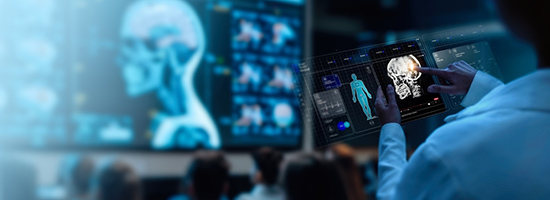Advances in Motion provides health care professionals with information about latest breakthroughs, research and clinical advances from Massachusetts General Hospital.
EXPLORE OUR SPECIALTIES BROWSE OUR TOPICS SUBSCRIBE TO RECEIVE UPDATES
Featured In Cardiovascular
Study Shows Sedentary Time Increases Cardiovascular Disease
Sedentary time negatively impacts heart health regardless of whether a person follows exercise guidelines.
Featured In Neuroscience
From Stroke Detection to Cancer Screening: AI Tools Advancing Imaging Efficiency
Mass General Brigham has developed initiatives for artificial intelligence (AI) governance and inclusion of medical expertise to address an influx of AI technology in medical imaging.
Featured In Oncology
Optimizing Treatment Alternatives for Relapsed/Refractory T Cell Lymphomas
Massachusetts General Hospital leads the global PETAL consortium to advance the understanding and treatment of newly diagnosed and relapsed/refractory T cell lymphomas.
Featured In Rheumatology, Allergy and Immunology
Innovations in Allergy Immunotherapy: Perspectives From Sarita Patil, MD
Food allergies represent a growing public health concern, affecting millions of individuals globally and posing significant clinical and quality-of-life challenges. However, their efficacy remains inconsistent, with only a subset of patients achieving long-term tolerance.
Featured In Ophthalmology
Non-invasive OCTA Imaging Biomarker Tied to Neovascular Glaucoma in Patients With Proliferative Diabetic Retinopathy
John B. Miller, MD, Edward S. Lu, MD, and colleagues found retinal ischemia on widefield swept-source optical coherence tomography angiography was associated with 13-fold increased odds of neovascular glaucoma, a vision-threatening complication in patients with proliferative diabetic retinopathy.
The Latest Oncology Advances
ROS-Sensing Pathway Influences Mitochondrial Activity, Regulates Response to Cisplatin
Liron Bar-Peled, PhD, and colleagues have determined that mitochondrial function is pivotal to chemotherapy response and may help identify tumors that are sensitive to subtypes of chemotherapeutic agents.
Pursuing a Gentler Path to Treat—and Potentially Cure—Acute Myeloid Leukemia
The PARADIGM study compared intensive induction chemotherapy (IC) to a novel combination therapy, azacitidine and venetoclax (aza-ven), in patients newly diagnosed with acute myeloid leukemia and eligible for IC. Results showed that aza-ven clearly outperformed IC in patients enrolled on study.
Advances Specialties
Cardiovascular
Simple New Noninvasive Exercise Measure Can Risk-Stratify Patients With Dyspnea on Exertion
Gregory D. Lewis, MD, and colleagues recommend measuring time to VO2 recovery of 12.5% after cardiopulmonary exercise testing of patients with dyspnea on exertion, showing that this metric closely reflects cardiac-specific performance and predicts heart failure outcomes.
Neuroscience
Digital App Improves Quality of Life for Caregivers of Patients Undergoing HSCT
A digital app created by Jamie M. Jacobs, PhD, Areej El-Jawahri, MD, and colleagues significantly improved quality of life, depression and PTSD symptoms, and coping skills of family and friend caregivers of patients undergoing hematopoietic stem cell transplantation, compared with usual care.
Orthopaedics
A Next-Generation Approach for Managing Periprosthetic Joint Infection in Total Joint Arthroplasty
Orhun Muratoglu, PhD, Ebru Oral, PhD, and their team are developing a gentamicin-containing polyethylene material to deliver localized antibiotics for total joint replacements. Their goal is to reduce periprosthetic joint infections and improve the outcomes of two-stage revision surgeries, the current standard of care.
May 9, 2025
Conference: Midlife Women's Health 2025: A Multidisciplinary Approach to Care
The Midlife Women's Health 2025 course is led by a multidisciplinary group of experts from Massachusetts General Hospital who will present on the evaluation and management of osteoporosis, gastrointestinal malignancy, stress, obesity, substance use disorder, anxiety, sexual dysfunction, breast cancer, and menopausal hormone therapy to assist clinicians in caring for their midlife patients.
Brain mechanisms of vagus nerve stimulation and stress reduction training for migraine
The study involves multiple visits over 6 months. You will complete an 8-week stress reduction treatment that includes a medical device worn in the ear and attend MRI and PET scans. You will also complete daily migraine diaries online.
Multimodal profiling of stress-induced immune reprogramming in cardiovascular participants
The purpose of this research study is to learn about the effects of stress on the brain and disease of the heart and blood vessels (cardiovascular disease or CVD).



